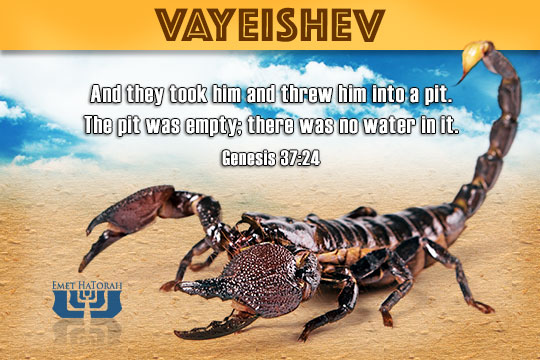Parashat Vayeishev - Genesis 37:1-40:23
Series:

And they took him and threw him into a pit. The pit was empty; there was no water in it. (Genesis 37:24)
Parashat Vayeishev begins the story of Joseph. When we first encounter him, he is a seventeen year old young man. We learn that his father, Jacob, had a special love for him above all of his eleven brothers. He was loved so much so that his father had given him a special, and highly recognizable garment that distinguished him from among his brothers. It was this disproportionate love that stirred up jealousy from his brothers and fostered their resentment toward him. That resentment eventually turned to a genuine hatred of Joseph and caused his brothers to eventually plot to do away with him.
As the story goes, one day Jacob tells Joseph to go out to the land of Shechem where his older brothers were watching over the flock. He was to check in on them and see how they were doing and then report back to his father. His father knew he would give him the scoop on what his other sons were really doing while they were away from home with the flock. His brothers probably called him the Little Snitch. And being his father’s spy didn’t earn him any brownie points with his brothers. It only stirred up more hatred toward him.
When Joseph finally tracked down his brothers, his presence was not well received. As a matter of fact, when they saw him coming in the distance they conspired on how they could kill him. Fortunately Reuben, the eldest brother, dissuaded his brothers from actually killing him and instead, convinced them to throw him into a pit until he could come up with a plan of what to do with him. The description of their throwing Joseph into the pit, however, is an interesting one. The Torah says, “And they took him and threw him into a pit. The pit was empty; there was no water in it” (Genesis 37:24). Since the Torah tells us that the pit was empty, why does it have to follow this up by letting us know there was no water in it? Why wasn’t it sufficient to simply let us know that the pit was empty?
The word the Torah uses for “pit” here is the Hebrew word bor. It can refer to a pit, well or cistern. Therefore, it would be natural to assume that there would have been water in the bor. However, since there was no water in it, we must naturally ask ourselves, “What was in it?” The majority of Jewish commentators on this passage agree that the Torah specifically declares there was no water in the bor in order to let us know that in place of water, it was filled with snakes and scorpions. If this is the case, being in the pit was no pleasant experience for Joseph.
But if this is true, why didn’t the Torah just tell us that there were snakes and scorpions in the pit, rather than leaving it up to deduction for us to figure this out? The answer is that sometimes it is only when we realize what is missing that we discover something else has taken its place. This is especially true when it comes to spiritual matters. Torah is compared to water, as it is said, “Come, everyone who thirsts, come to the waters [of Torah]” (Isaiah 55:1). Each person has a bor within them. It is our head. No one is truly “empty-headed.” Our minds are always packed to the max. However, it may not be filled with the proper materials. We should be pouring into ourselves the water of Torah and spiritual matters each and every day. When we don’t, we will easily find that our minds will be consumed with the matters of the world, the influences of the world, and the values of the world. We will wake up one day and realize our minds have been drained of the water of Torah and are only a home to the snakes and scorpions of the world. What’s in your bor?








